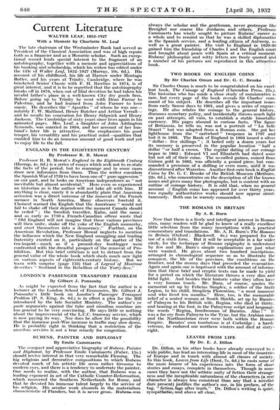Now that there is a lively and intelligent interest in
Roman sites, many readers will be glad to know of a really excellent little selection from the many inscriptions with a practical commentary and translations. Mr. A. R. Burn's The Romans in Britain (Oxford : Blackwell. Os.) was prepared for the use of a sixth form. But it will be acceptable in a far wider circle, for the technique of Roman epigraphy is understood by few and Mr. Burn's simple explanations are just what were wanted. He gives about two hundred inscriptions. arranged in chronological sequence so as to illustrate the conquest, the life of the province, the conditions on the frontier, and the stormy days that preceded the evacuation. Again and again one is impressed with the amount of informa- tion that these brief and cryptic texts can be made to yield for a period on which the literature throws a very dim and fitful light. And besides their historic value they often have a very human touch. Mr. Burn, of course, quotes the memorial set up by Felicius Simplex, a soldier of the Sixth Legion, to his child, Simplicia Florentine, " a most innocent soul who lived ten months." Here, too, is the memorable relief of a seated woman at South Shields, set up by Berates of Palmyra to his British wife, Regina, who died at thirty, and bearing at the foot, in the Palmyrene script and language.
the words " Regina, freedwoman of Barates. Alas ! It was a far cry from Palmyra to the Tyne, but the Arabian oasis and the Northumbrian river were both within the Roman Empire. Barates' own tombstone, is at Corbricige ; a hardy veteran, he endured our northern winters and died at sixty- eight.






































 Previous page
Previous page